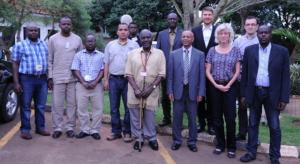Laboratory technicians receive training on real time ebola detection
Entebbe, 23rd September 2014:- The Uganda Virus Research Institute (UVRI) hosted a two-day intensive regional training on Filovirus Real Time RT-PCR assay for Ebola Virus detection aimed at strengthening the Emerging and Dangerous Pathogens Laboratory Network (EDPLN), expand Ebola virus testing capacity in the WHO African region to meet the requirement of biosafety/biosecurity and quality assurance for laboratory testing of EVD.The training was organized by WHO AFRO’s Disease Prevention and Control Cluster for laboratory scientists or senior technologists from each participating country.
Officiating at the closing ceremony, the WHO Country Representative Dr. Wondimagegnehu Alemu noted the limited capacity in many countries in Africa to diagnose and confirm dangerous pathogens such as Ebola virus in which case the specimen is sent overseas for confirmation thus delaying the response. As part of the capacity building in countries, the WHO Regional Office for Africa have established network of laboratories with such capacity thus the need for the workshop to standardize their testing platform in accordance to a WHO SOPs. We are pleased that UVRI accepted to host this important training workshop at its excellent facility.
Dr. Alemu further said poor health systems in the affected countries had made it difficult to deal with the Ebola Epidemic in some of the West African countries. “It is time to advocate to country health and policy makers to build capacity to diagnose and confirm as early as possible, in order to contain the diseases promptly. We need to invest more in our laboratories so that we become part of the change,” he said.
Dr. Alemu reiterated WHO’s commitment to continue working with partners to support countries have capacity for timely diagnosis and confirmation dangerous pathogens within the sub-region.
Dr. Stephan Oelshlaeger and Dr. Karin Rottengatter from Aetona Diagnostics in Germany facilitated the training. The aim was to equip the participants with new and improved methods in the diagnosis for Ebola. The facilitators were, however, impressed by the advanced technology being used at UVRI for research and diagnosis.
“The high level & up-to-date technology being used at UVRI is worth noting as it is helpful in the fight against Ebola & other epidemics.” said Dr. Oelshlaeger
Dr. Edward Katongole Mbidde, UVRI Director thanked WHO for the continued support in diagnostics & research. He appreciated the presence of the WHO accredited Lab at UVRI which has helped tremendously in carrying out research & confirmation of epidemics in the country.
Dr. Mbidde implored the participants to apply knowledge acquired from the training in their laboratories to play their role in the response for EVD. He said if there is an epidemic in one African country, the impact maybe felt regionally and even globally.
Since March, Guinea, Liberia, Sierra Leone and Nigeria, have been grappling with EVD outbreak of unprecedented magnitude. The outbreak is the largest on record and is a threat to the entire African continent and beyond.
The first case of Ebola was detected in December 2013 and as of 23 September 2014, the ongoing outbreak has sickened 5,843 people and caused 2,803 deaths.
In September 2014, the UN General Assembly and Security Council approved resolutions to create the United Nations Mission for Ebola Emergency Response (UNMEER) that’d be at the forefront of containing the ongoing outbreak.
The training workshop attracted a total of 12 participants from 12 countries namely Algeria, Cameroon, Central African Republic, Cote d’Ivoire, Democratic Republic of Congo, Gabon, Ghana, Kenya, Madagascar, Senegal, South Africa and Uganda.



